With the rise of technology, medical alert systems have become vital for ensuring the safety of seniors and individuals with chronic conditions. The advent of GPS technology has enhanced these systems, providing more freedom to users while offering peace of mind to their loved ones. This article will provide a detailed guide on choosing a medical alert system with GPS technology to help you select the right device for your needs.
Understanding Medical Alert Systems
Before delving into the factors that determine the best medical alert system, it’s crucial to understand what it is and how it operates. Traditional medical alert systems comprise a wearable device, usually a pendant or wristband, and a base unit. Upon pressing a button on the wearable device, the base unit contacts a monitoring center, alerting emergency services about a possible medical emergency.
Over time, technology has refined these systems, and today, we have mobile medical alert systems that offer on-the-go protection. These systems use cellular service for connectivity and GPS technology to track the user’s location accurately, enabling emergency services to locate the user when they are away from home.
Factors on How to Choose a Medical Alert System GPS
1. Monitoring Service
The monitoring service is the first factor to consider when selecting a medical alert system. Most medical alert systems providers offer 24/7 monitoring services, meaning emergency responders are available round the clock to assist. Ensure that the company you choose has a well-staffed, responsive monitoring center. Some medical alert companies also offer two-way communication, which allows users to discuss their situation with the emergency monitoring center, further enhancing their safety.
2. GPS Accuracy and Cellular Connection
The core feature of a mobile medical alert device is GPS technology that allows accurate location tracking. The precision of the GPS is crucial, especially during an emergency when every second counts. Make sure the system you choose provides reliable, pinpoint location tracking.
Also, since these mobile systems rely on a cellular connection, ensure that the cellular service used by the medical alert device company is strong in your area.
3. Automatic Fall Detection
Another essential feature to look for in a medical alert device is automatic fall detection. Falls are the leading cause of injury among older adults, and sometimes, the fall can leave them incapable of pressing the emergency button. Devices with automatic fall detection can sense a fall and send an alert to the monitoring center, even if the user cannot.
4. Battery Life
Battery life is critical, especially for a mobile medical alert system. Choosing a system with a long-lasting battery is important so you don’t have to worry about frequent charging. Most mobile medical alert devices provide a battery life of 24 hours to several days, so choose one that best fits your lifestyle and needs.
5. Cost and Contract Terms
The cost can’t be ignored when choosing a medical alert system GPS. The cost generally includes an equipment fee, an activation fee, and a monthly fee. While comparing prices, check if the company offers a price lock guarantee, which ensures your monthly fees won’t increase over time.
Some medical alert system providers might require long-term contracts, while others offer a month-to-month service. Be sure to understand the contract terms and check for any hidden fees.
6. Medication Reminders
For users on regular medications, medication reminders can be an essential feature. This functionality will alert users to take their medication, helping them stick to their medication schedules. This feature can significantly enhance users’ health management, making it a critical factor when choosing a medical alert system.
Best Medical Alert Systems to Consider
Choosing the right medical alert system is crucial when it comes to ensuring safety and independence for older adults or individuals with medical conditions. Brands like Philips Lifeline, Bay Alarm Medical, MobileHelp, Medical Guardian, and LifeFone offer various GPS-related features that can be tailored to individual needs.
Leading in Versatility: Philips Lifeline’s GPS Medical Alert Systems
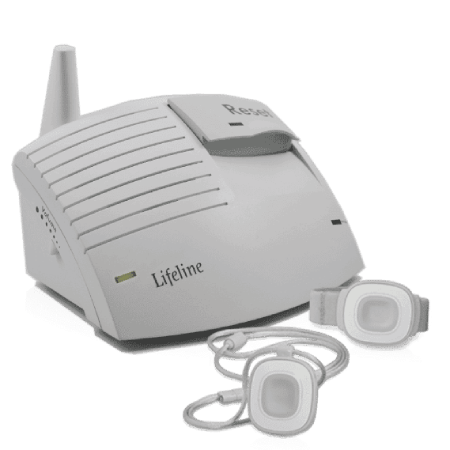

Philips Lifeline’s GoSafe 2 system stands out with its AutoAlert fall detection and advanced location tracking using GPS and other technologies. The device is built for those on the go and provides fast assistance, whether you’re at home or away. Its key GPS-related features are:
- AutoAlert Fall Detection: The system can automatically detect falls and contact the response center, even if you cannot press the help button.
- Multiple Location Technologies: The device uses up to six advanced location technologies, including GPS, to accurately determine your location during an emergency.
PROS
CONS
Comprehensive Protection at Affordable Rates: Bay Alarm Medical
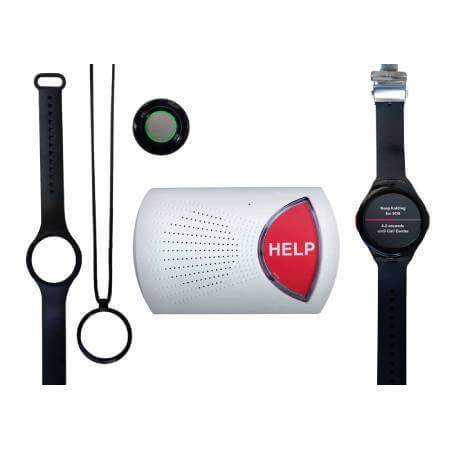

Bay Alarm Medical’s On-The-Go system is another popular choice. Known for its reliable GPS tracking, the system ensures you get help no matter where you are. The key features are:
- 24/7 GPS Tracking: The system offers precise location tracking, ensuring swift assistance during emergencies.
- Two-Way Communication: It includes built-in two-way communication, allowing you to speak directly with the emergency response team.
PROS
CONS
Innovation meets Affordability: MobileHelp’s GPS Medical Alert Systems
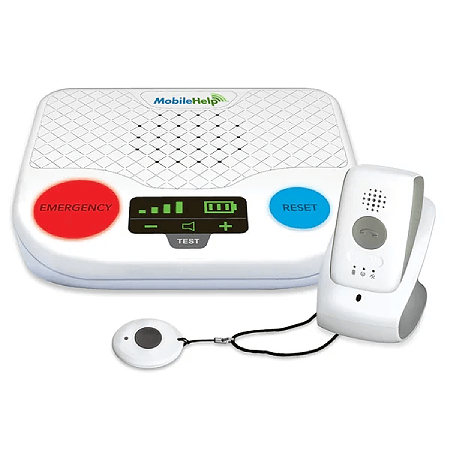

MobileHelp‘s Mobile Duo offers a range of impressive features, including a GPS-enabled mobile alert system for use at home or on the go. Some of its unique GPS features are:
- GPS Medical Alert System: The Mobile Duo system has two mobile devices that can be used away from home, offering location tracking and instant connectivity to the emergency center.
- Location Requests: Loved ones or caregivers can request the location of the device at any time, providing peace of mind.
PROS
CONS
Redefining Mobility: Medical Guardian’s GPS Medical Alert Systems
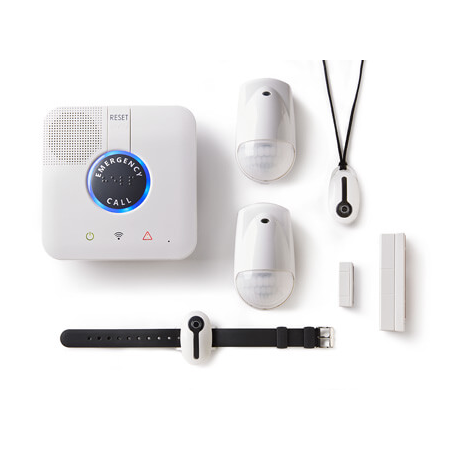

The Active Guardian from Medical Guardian offers an all-in-one wearable medical alert system with a built-in GPS and Wi-Fi technology. Key GPS-related features include:
- Precise Location Tracking: With the combination of GPS and Wi-Fi, the device offers accurate location tracking, enhancing safety when away from home.
- Automatic Fall Alert: Like Philips Lifeline, Active Guardian also has an automatic fall detection feature.
PROS
CONS
Customized Safety Solutions: LifeFone’s GPS Medical Alert Systems
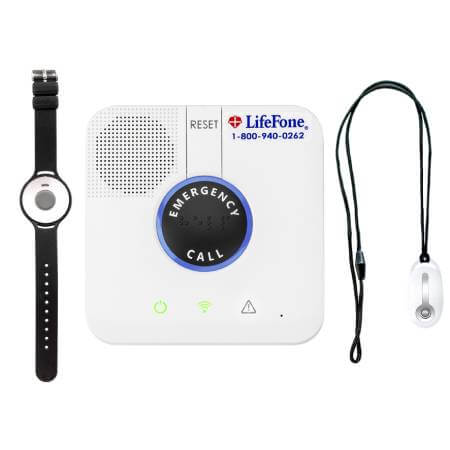

LifeFone’s At-Home and On-the-Go GPS, Voice-in-Necklace, offers in-home medical alert systems and outside coverage versatility. Key GPS features of this system include:
- Two-In-One System: It’s designed for home and on-the-go use, with GPS technology enabling location tracking during emergencies.
- Caregiver Notifications: The system can notify caregivers with location and status alerts, ensuring loved ones are always in the loop.
PROS
CONS
Choosing the best medical alert system with GPS technology depends on your needs and lifestyle. Assessing the key GPS features each brand offers can help determine which system would be the best fit. Whether it’s automatic fall detection, accurate location tracking, or caregiver notifications, these features offer medical alert system users a blend of safety and independence.
By weighing the capabilities of the systems offered by Philips Lifeline, Bay Alarm Medical, MobileHelp, Medical Guardian, and LifeFone, you can ensure that you or your loved one is equipped with the most suitable medical alert system.
FAQs
What is a fall detection device?
A fall detection device is a specialized medical alert system that automatically senses if the user has fallen. If a fall is detected, the device sends an alert to the monitoring center, which can dispatch emergency services if necessary.
What is a medical emergency response system?
A medical emergency response system, also known as a personal emergency response system, is a type of medical alert system that allows users to call for help during a medical or personal emergency by pressing a button on a wearable device.
What’s the difference between monitored and unmonitored medical alert systems?
Monitored medical alert systems are connected to a professional monitoring center that provides 24/7 emergency response services. On the other hand, Unmonitored systems directly dial a predetermined set of numbers (like family or friends) when the alert button is pushed.
What is a traditional medical alert system?
A traditional medical alert system typically includes a base unit that connects to a landline or cellular system and a wearable pendant or bracelet with a help button. When pressed, the help button signals the base unit to contact a monitoring center or set contacts.
Is there an additional monthly fee for using medical alert systems?
Most medical alert companies charge a monthly fee that covers the use of the equipment and the 24/7 monitoring service. The monthly cost can vary based on the chosen system type and additional features like fall detection.
Are there activation fees for medical alert systems?
Some medical alert companies charge a one-time activation fee when you start the service, but many companies have done away with this fee. It’s important to ask about all potential fees before choosing a system.
What is an emergency contact in the context of medical alert systems?
An emergency contact is a person (like a family member, friend, or neighbor) whom the medical alert company will contact in case of an emergency. Most medical alert systems require users to provide a list of emergency contacts during setup.
Do all medical alert systems offer fall detection?
Not all systems offer fall detection. This feature is often optional and may require an additional fee. It’s crucial to ask about this feature if you feel it’s necessary for your situation.
Conclusion
Selecting the perfect medical alert system with GPS requires careful consideration of the user’s specific needs, lifestyle, and budget. This article provides a comprehensive guideline to aid you in making an informed choice. With the right medical alert system, you or your loved one can enjoy peace of mind and lead an active, independent lifestyle.
